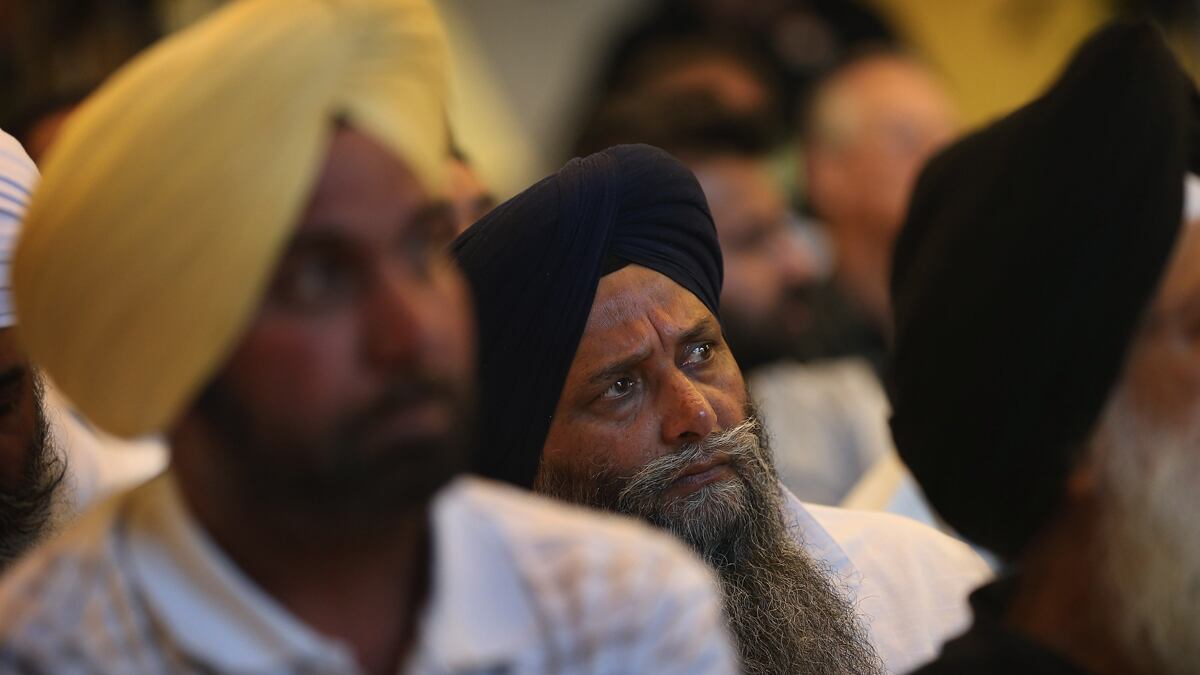On July 3, 2011, a crowd of about 50 teenagers looted a BP gas station in Milwaukee’s Riverwest neighborhood, in what the city’s police chief described as a “mob-like” incident.

The station was owned by Jay Walia, a Sikh businessman. The crime unnerved the Sikh community in Oak Creek, a Milwaukee suburb where Sikhs say they have experienced a string of recent robberies and other crimes over the past couple of years.
In the mob-attack aftermath, Satwant Singh Kaleka, president of the 400-member Sikh Temple of Wisconsin, called for action. Kaleka had himself reported being the victim of a robbery at his own gas station shortly before the July 3 attack, Milwaukee District Attorney John Chisholm said, and he was worried that the community wasn’t properly protected. So he called Chisholm and state representative Josh Zepnick and asked them to come talk to his congregation.
“It was a string of them and so that was their concern, that they were being specifically targeted,” Chisholm said. “That’s why he wanted us to come there, to see a little bit about what their faith was about so we had a greater sensitivity to the issues that concern their community.”
As Chisholm stood across the street watching the police surround the Sikh Temple on Sunday, he said, he couldn’t help thinking of that meeting last year.
Kaleka was one of six members of the temple who was killed in Sunday’s shooting spree, which police said was carried out by an Army veteran named Wade Michael Page. Kaleka’s son told local news outlets that his father rushed the gunman and was wounded by gunfire, then hid in a room in the temple, where he died. Kaleka, 65, was a cofounder of the temple and father of two sons.
“Believe me, it didn’t escape my attention that we had just been there a year before, too, to address these kinds of concerns,” Chisholm said. “And we’re going to have to do it again.”
Since the Sept. 11 terrorist attacks, Sikhs across the country have been especially vigilant, largely because their turbans can lead them to be mistaken for Muslims. Racist assaults of this nature go back at least as far as Sept. 15, 2001, when an aircraft mechanic named Frank Roque shot and killed Balbir Singh Sodhi, a Sikh immigrant who owned a gas station in Mesa, Ariz. Prosecutors said Roque believed Sodhi was Muslim and shot him in retaliation for the terrorist attacks.
“I stand for America all the way,” Roque shouted as he was arrested.
The fear of such attacks has never fully subsided. Kaleka and other Sikh community leaders in Milwaukee were concerned that “people weren’t just looking on them as just outsiders,” Chisholm said. “I think their general concern was that they not be identified as part of some anti-American group.”
That concern has spread to the federal government. In April, New York Rep. Joseph Crowley and 91 other members of the House sent a letter to the Department of Justice urging a federal push to gather data on hate crimes directed against Sikh-Americans.
While police found nothing to suggest the looters in 2011 targeted Walia’s gas station because he was Sikh, Kaleka and the larger Sikh community in the Milwaukee area were concerned by that and a string of other crimes, Chisholm said.
According to a local Oak Creek news website, Kaleka had told local officials that there had been multiple incidents at stores and gas stations in the Sikh community. Robberies are not unheard of in the neighborhood, where Sikhs own grocery stores, liquor stores, and gas stations, but Kaleka told the authorities he believed Sikh owners and workers were being targeted on purpose.
“There is no question that the store owners that have been shot, that have been killed, I think their concern was that they were undervalued,” Chisholm said. “They had a sense that someone would say it’s just so-and-so grocery-store owner.”
“I personally have been to several funerals for young men who were shot and killed while working at gas stations,” Zepnick said. Whether or not racial animus was a factor in the killings, he said, these deaths can feel that way to the community. “There were enough examples to say we’ve got to do a better job here and find out what’s going on.”
But even after the 2011 meeting with Kaleka, Zepnick said, it has remained difficult to track possible bias crimes against Sikhs: in part because many of them involved small offenses, and in part the offenses were not crimes so much as a persistent climate of prejudice.
“If you get someone in your taxi cab who says ‘Go f--k yourself,’ or ‘Go back to Iraq,’ or ‘Don’t blow me up’—if they say something asinine like that in your taxi cab, what are you going to do?” Zepnick asked.
Whether or not the crimes are hate crimes, Sikhs in the area say they’ve continued. Malwinder Sidhu, a 32-year-old employee at the S.K. Petro Mart gas station that Kaleka owned, said that the gas station had been robbed last month, when thieves stole cigarettes in a smash-and-grab job.
On Monday, friends and acquaintances continued to reflect on the man who had led his fellow Sikhs.
“He was a very hardworking man,” Sidhu said of Kaleka. “The neighborhood liked him and he liked the neighborhood.”
“He was an American, pure and simple,” Chisholm said. “His values were identical to any of what we consider to be the best values of the people who live and work in our community.”





